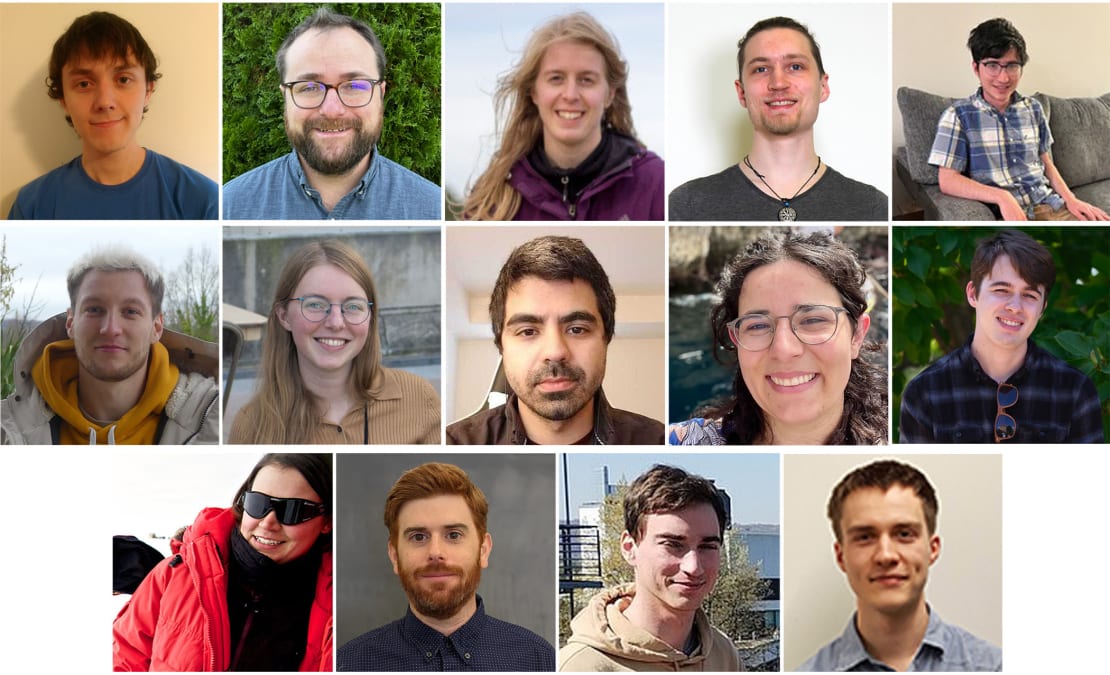The IceCube Impact Awards, established in 2018, recognize broad and significant contributions to IceCube that would not normally be acknowledged through its publications. There are three awards: individual, legacy, and group awards.
Current Recipients — Spring 2025

Christoph Günther
— for leadership and coordination in the development and testing of the mini-mainboard, an integral part of future IceCube instrumentation.

Sarah Mechbal
— for leadership and coordination of the characterization and acceptance testing of IceCube Upgrade mDOMs, while fostering a cooperative communication environment.

Giacomo Sommani
— for tireless efforts to improve the performance and robustness of the reconstruction of IceCube real-time alerts.
The IceCube Group Impact Award:
Bennett Brinson, Jimmy DeLaunay, Hannah Erpenbeck, Philipp Fürst, Sam Hori, Niclas Krieger, Karlijn Kruiswijk, Michael Larson, Sarah Mancina, Jesse Osborn, Larissa Paul, Steve Sclafani, Timo Stürwald, and Jan Weldert — for the development of the next-generation online and offline filtering and event selection for all IceCube data.

Past Recipients
2024 (Spring)
- Lasse Halve — for key contributions to D-Egg and mDOM PMT testing with significant impact on optical module production for the IceCube Upgrade.
- Massimiliano Lincetto — for exceptional support and improvements to two real-time software projects: SkyMist and Skymap Scanner.
- Nora Valtonen-Mattila — for significant contributions to supernova monitoring operations, including the readout of HitSpool data in response to supernova alerts and introducing a novel application of the supernova data acquisition system.
- Group Impact Award:
- Erik Ganster and Richard Naab — for leadership in enabling and supporting a wider use of the NMFit analysis software tool in the collaboration.
2023 (Spring)
- Cristina Lagunas Gualda — for leadership in investigations into the characterization of track reconstruction, including angular errors, for real-time alerts.
- Manuel Silva — for producing general purpose simulations, and providing high quality documentation, in support of many analyses.
- Jessie Thwaites — for essential contributions to infrastructure for gravitational wave alert follow-up and dedication to making the collaboration and its science more accessible.
- Group Impact Award:
- Tania Kozynets and Tom Stuttard — for unrelenting investigations into systematic uncertainties in DeepCore and key contributions to IceCube Upgrade simulations.
2022 (Spring)
- Thomas McElroy — for outstanding efforts on improving calibration and documentation of the effective optical module efficiency — a key systematic uncertainty in IceCube.
- Jessie Micallef for developments and application of neural networks for DeepCore studies, and for sustained contributions to diversity, equity and inclusion.
- Tianlu Yuan for continuing efforts to improve simulation, reconstruction and the understanding of systematic uncertainties in IceCube.
- Legacy Impact Award:
- Serap Tilav for longstanding and outstanding contributions to all aspects of IceTop, and for being an invaluable resource for students, postdocs and other collaboration members.
2021 (Fall)
- Alexander Trettin for key contributions to the treatment of systematic uncertainties in oscillation analyses as well as for taking a leading role in promoting diversity, equity, and inclusion in IceCube.
- Spencer Griswold for outstanding contributions to the supernova DAQ software.
- William Luszczak for key contributions to improving reproducibility of science results in IceCube and careful comparison of the TXS 0506+056 observations using various point source datasets.
- Group Impact Award:
- The 2021 Group Impact Award recognizes complete commitment by Colton Hill, Maximilian Meier, Yuya Makino, Ryo Nagai, Ken’ichi Kin, in spite of challenges presented by COVID-19, to the D-Egg project, including assembly, production, and development of FAT testing and of the mainboard.
2021 (Spring)
- Alex Pizzuto for key contributions to the improvement of the fast response analysis and its exemplary documentation.
- Robert Stein for key contributions to the improvement of the online alert system, including the automation and documentation of real-time event direction scans.
- Sebastian Fiedlschuster for outstanding contributions in the development of IceCube’s GitHub model in its emergence as a central element of IceCube’s codebase.
- Legacy Impact Award:
- Kotoyo Hoshina for diligent perennial efforts in vetting and enhancing core IceCube software central to the collaboration’s physics analyses.
2020 (Fall)
- Liz Freedman for a pivotal role in establishing an exemplary documentation culture via advancement of the data sample documentation and control system for the IceCube internal repository.
- Mirco Huennefeld for recognized leadership in establishing Machine Learning as a central element in IceCube data analyses.
- Mike Richman for outstanding contributions to the development of a broad suite of collaboration analysis software, including the neutrino point source csky package.
- Group Impact Award:
- The 2020 Group Impact Award recognizes key contributions by Ben Smithers, Christian Haack, Erik Ganster, Grant Parker, Ibrahim Safa, Jöran Stettner, Zelong Zhang to the development and implementation of a novel Monte Carlo tool for systematic studies relevant to a suite of data analyses.
2020 (Spring)
- Carlos Argüelles for key contributions in the development of a suite of software tools used broadly in IceCube analyses, and his leading efforts in the advancement of diversity, equity and inclusion within the collaboration.
- Philipp Eller for key contributions to the development of and support for event reconstruction and detector systematics, in particular relevant to the collaboration’s low-energy analyses.
- Summer Blot for lasting commitment to promote cooperation and cohesion within the collaboration environment, in particular through leadership in the advancement of the areas of diversity, equity and inclusion.
- Legacy Impact Award:
- Chris Wendt for tireless efforts in the development of a detailed understanding of the DOMs, a cornerstone for all IceCube analyses, and of core electronic elements for the project.
2019 (Fall)
- Lu Lu for leading contributions in promoting IceCube and its science to the general public, in particular through augmented reality experiences.
- Thomas Kintscher for key contributions to the IceCube realtime-system software which has been crucial to many high-profile physics results.
2019 (Spring)
- Joshua Wood for his leadership and commitment in transforming Skylab into a unified analysis framework for point source analyses.
- Michael Larson for long-term key contributions to the areas of software development, simulation production and data processing central to a suite of data analyses.
- Tessa Carver for key contributions to the improvements of level 3 muon and point source event selections which are the bases for multiple IceCube analyses.
- Legacy Impact Award:
- Chris Weaver for lasting contributions to the advancement, maintenance and support of several core IceCube software packages.
2018 (Fall)
- Sarah Nowicki for long-standing contributions to the broad development of critical tools and advanced algorithms for reconstructing IceCube events.
- Spencer Axani for key improvements to waveform calibration, the basis for IceCube data processing, and the development of hands-on particle physics outreach devices.
2018 (Spring)
- Jakob van Santen for key contributions to improvements of, and support for, the core IceCube software and the crucial impact of those efforts on the broad scientific program.
- Martin Rongen for key contributions to the detector calibrations that have substantially improved the understanding of the IceCube neutrino telescope.
- Legacy Impact Award:
- Dima Chirkin for perennial efforts in revolutionizing the methods to determine the deep glacial ice properties that have become a cornerstone for IceCube analyses.
